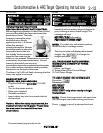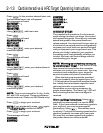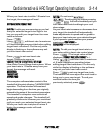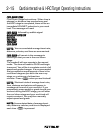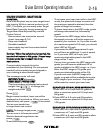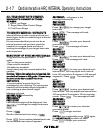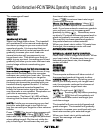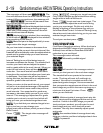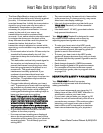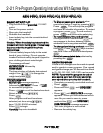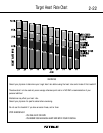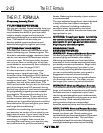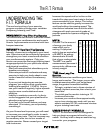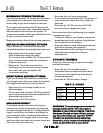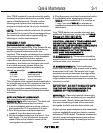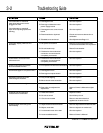
••
The Heart Rate Monitor strap provided with
your treadmill should be worn directly against
you skin, 1-2 inches below the pectoral
muscles/breast line. Initially the transmission
signal for your heart rate may be erratic or
nonexistent. Perspiration on your skin is
necessary for proper transmission. In most
cases, by the end of your warm-up,
transmission becomes consistent and
accurate. If not, saline solution should be used
to moisten the sensors on the back of the
strap. Women should be careful to place the `
transmitter below their bra line. If the
transmitter strap is adjusted or moved while
exercising, communication may be temporarily
affected.
••
If communication is lost for 30 seconds, the
treadmill will automatically shut off. It is
important to keep the transmitter adjusted
properly.
••
The transmitter emits a fairly weak signal to
the receiver, so interference from more
powerful airwaves (everything from other
exercising equipment to airplanes) is not
uncommon. The good news is that
interference is usually quite brief. If you
continue to have intermittent heart rate
display problems, consult your local service
technician. The problem may be with the
transmitter batteries.
••
Oxygen intake directly affects your heart
rate. To prevent your heart rate from spiking
up, maintain a constant rate of oxygen intake.
Maintaining a fluid motion while walking or
running and refraining from talking helps to
keep your heart rate from spiking.
NNoottee:: TTaallkkiinngg wwhhiillee iinn tthhee HHRRCC ssttaaggee ccaann
ccaauussee yyoouurr hheeaarrtt rraattee ttoo rriissee iinnddeeppeennddeenntt
ooff yyoouurr wwoorrkkllooaadd aanndd ccaauussee tthhee ssooffttwwaarree ttoo
mmaakkee nneecceessssaarryy cchhaannggeess.. TThhiiss wwiillll ccaauussee
iinnaapppprroopprriiaattee ssppeeeedd aanndd//oorr ggrraaddee cchhaannggeess,,
aanndd aaffffeecctt tthhee eeffffiicciieennccyy ooff yyoouurr HHRRCC wwoorrkkoouutt..
••
A grounded outlet is critical for the HRC
system to function properly.
••
If erroneous heart readings are displayed
above the target selected, you can pull the
transmitter portion away from your chest for
several seconds. This will keep you from
exiting HRC.
••
Two users wearing the same kind of transmitter
at the same time, in close proximity, may cause
false heart rate display readings.
••
Use only the transmitter provided with your
TTRRUUEE HHRRCC
Treadmill, or a Polar standard
transmitter.
••
Use dedicated 110 VAC, grounded outlet to
help prevent interference.
Your
TTRRUUEE HHRRCC
Treadmill is designed to meet
the needs of both walkers and runners by
adjusting speed and grade accordingly:
••
To raise your heart rate in the HRC mode,
speed will always increase first, until you reach
your maximum speed, followed by grade (if
grade is used in the workout).
••
To lower your heart rate in the HRC mode,
grade will always decrease first, until you reach
0% grade, followed by speed (if grade is used in
the workout).
••
Each change of speed is .1 MPH increments.
••
Each change of grade is .5% grade increments.
••
For examples of workout maximum speed
and maximum grade, refer to program charts
on page 2-9.
HHEEAARRTT RRAATTEE SSAAFFEETTYY PPAARRAAMMEETTEERRSS
Your
TTRRUUEE HHRRCC
Treadmill computer
software is programmed with the following
safety parameters:
••
If your heart rate exceeds your target by 12
beats, there will be a 30% MET reduction in
workload to reduce your heart rate.
••
If your heart rate exceeds your target by 20
beats, the unit will automatically shut off as a
precautionary measure. (Be cautious when
selecting your target heart rate so the 20
beat variance will not exceed your maximum
heart rate as determined by your physician).
Heart Rate Control Important Points
Heart Rate Control Patent 5,462,504
2-20



